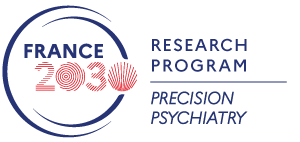Our research program is funding doctoral fellowships in 2025 to support innovative research projects in precision psychiatry. A second wave of funding is planned for 2026, to further expand opportunities for young researchers and reinforce scientific advances in this field.
Discover the project here.
Proposals should address one of the following themes:
Markers for stratification of dimensions and/or transnosographic clinical forms
- Research and identification of clinical, cognitive, omics, environmental, imaging, EEG and/or digital markers, using PEPR PROPSY databases, existing national and international databases or those in the process of being acquired, etc.
- Exploration of pathophysiological mechanisms (immunometabolism) underlying biomarker anomalies.
Modeling and artificial intelligence
- Development of learning algorithms (AI, machine learning, contrastive learning) based on multimodal databases.
- Exploitation of multimodal databases to identify algorithms for stratifying psychiatric pathologies.
Candidates must hold a Master’s degree (or equivalent) in neuroscience, psychiatry, artificial intelligence, biology or related disciplines.
The thesis must be carried out in a laboratory affiliated to a French institution authorized to award doctorates.
The thesis supervisor must be identified and have recognized expertise in the field.
Theses may be co-supervised with international laboratories (EU, USA, Canada), provided the doctoral student is enrolled in a French doctoral school. International co-financing may be considered.
The submission file must meet certain conditions:
be sent in full to the email address provided before the closing date and time,
be in unprotected PDF format,
not exceed the number of pages specified for the relevant documents,
comply with the minimum font size (11, Arial),
all required documents must be written in English.
Funding is intended to support doctoral theses in precision psychiatry. Each selected project will receive a grant to cover the costs of recruiting a doctoral student and implementing the research project:
- Maximum grant per project: €153,400, including a maximum of 18% in management costs.
- Co-financing : projects may include co-financing. These must be detailed in the application file, specifying their origin and use.
- Duration of funding: 3 years.
- Use of funds: remuneration of the doctoral student in accordance with current funding scales, operating costs directly linked to the research project and contribution to the costs of supervising and training the doctoral student.
- Submission deadline: May 7, 2025.
- Applications must be sent by email to the following address: aap@pepr-propsy.fr
- A confirmation of receipt will be sent after submission of the application.
- Please consult the call for proposals description, the template to be used for the application, the template for the CV, and the financial appendix to be completed (it does not need to be signed for submission).
Consult our answers here.
Program Scientific Director: Marion Leboyer
Program Manager: Marie-Hélène Soto
If you have any questions, please contact aap@pepr-propsy.fr

